Looking for natural remedies to improve your health and wellness? Look no further than medicinal plants and herbs! These plant-based medicines have been used for centuries in traditional medicine and offer a wide range of potential health benefits.
Herbal medicine is a form of natural healing that utilizes the medicinal properties of plants. Whether you’re dealing with a minor ailment or looking to support a healthy lifestyle, there’s a medicinal herb or plant-based medicine that can help.
Herbal remedies come in many forms, including teas, tinctures, capsules, and salves. These natural remedies can be used to treat a variety of conditions, from digestive issues to skin problems to anxiety and depression. By incorporating medicinal herbs into your daily routine, you can harness the power of nature to support your health.
Key Takeaways
- Medicinal plants and herbs have been used for centuries in traditional medicine.
- Herbal medicine is a form of natural healing that utilizes the medicinal properties of plants.
- Herbal remedies come in many forms and can treat a variety of conditions.
- Incorporating medicinal herbs into your daily routine can support your health and wellness.
The Power of Aloe Vera
Aloe vera is a succulent plant that has been used for medicinal purposes for thousands of years. It is a versatile plant that can be used both topically and orally to treat a variety of health conditions. Aloe vera is known for its gel-like substance found inside its leaves, which contains numerous beneficial nutrients, vitamins, minerals, and amino acids.
The use of aloe vera as a natural remedy for skin conditions is well-established. Its active compounds have anti-inflammatory and antioxidant effects, making it effective in treating burns, wounds, insect bites, and other skin irritations. Aloe vera gel can soothe the skin and speed up the healing process by stimulating cell regeneration.
In addition to its skin benefits, aloe vera can also be taken orally as a natural remedy for digestive issues, such as constipation and irritable bowel syndrome. Aloe vera can help to soothe the lining of the digestive tract, reducing inflammation and promoting regular bowel movements. It can also support immune system function due to its antiviral and antibacterial properties.
Research has shown that aloe vera can also be beneficial for lowering cholesterol levels, improving blood sugar control, and reducing inflammation throughout the body. Its anti-inflammatory effects may also help to ease joint pain and improve overall joint health.
To experience the benefits of aloe vera, you can use it topically by applying aloe vera gel to the affected area or take it orally as a supplement. Aloe vera supplements can be found in various forms, including capsules, tablets, and juices.

With its numerous health benefits, aloe vera is a powerful addition to any natural medicine cabinet.
Calming Effects of Chamomile
Chamomile is a medicinal plant and herb known for its calming and soothing properties. This plant has been used for centuries to promote relaxation, reduce anxiety, and improve sleep. It is a natural remedy that can help you achieve a state of calmness and serenity.
Chamomile is often consumed as a tea. The tea is made from the dried flowers of the chamomile plant. One of the active components of chamomile is apigenin, which has been shown to bind to specific receptors in the brain that help to reduce anxiety and promote sleep.
In addition to its calming effects, chamomile has been used to help with digestive discomfort, including gas, bloating, and cramping. It may also have anti-inflammatory benefits, which could help to reduce inflammation in the body and promote overall health.
If you are looking for a natural way to calm your nerves and achieve relaxation, chamomile tea or supplements may be an option for you. It is important to consult with a healthcare provider before using any herbal treatments or supplements.

Boosting Immunity with Echinacea
When it comes to natural ways to boost your immune system, echinacea is a go-to herb that has been used for centuries. Echinacea has been found to stimulate the immune system, helping to fight off infections and reducing the severity and duration of cold and flu symptoms.
The active compounds in echinacea work by stimulating the production of white blood cells, which play a crucial role in fighting off infections. Echinacea has also been found to have anti-inflammatory properties that can help reduce inflammation in the body, making it effective in treating conditions such as rheumatoid arthritis.
Research has also shown that echinacea can help in the prevention and treatment of upper respiratory tract infections, such as the common cold. In fact, one study found that participants who took echinacea daily for four months had fewer colds and less severe symptoms compared to those who didn’t take echinacea.
Echinacea is available in various forms, including capsules, extracts, and teas. It is important to note that while echinacea is generally safe for most people, those with autoimmune disorders or allergies to plants in the daisy family should avoid using it.
To benefit from the immune-boosting effects of echinacea, it is recommended to take it at the first signs of a cold or flu. Incorporating echinacea into your daily routine can also help strengthen your immune system overall.

Overall, echinacea is a powerful medicinal plant that can help boost your immune system and fight off infections. Whether taken in capsule or tea form, echinacea is a natural and effective way to support your overall health and well-being.
The Golden Spice: Turmeric
When it comes to medicinal plants and herbs, turmeric is a popular choice for its numerous health benefits. This bright yellow spice is commonly used in Indian and Middle Eastern cuisine, but has also been prized for its medicinal properties for thousands of years.
Turmeric contains a powerful anti-inflammatory compound called curcumin, which has been shown to have many health benefits. Studies have found that curcumin may help reduce inflammation in the body, which can in turn help alleviate symptoms of arthritis, digestive issues, and other inflammatory conditions.
In addition to its anti-inflammatory properties, turmeric is also a potent antioxidant. Antioxidants help protect the body from damage caused by free radicals, which can contribute to the development of chronic diseases like cancer, heart disease, and Alzheimer’s disease.
Research has also shown that turmeric may have a number of other potential health benefits. For example, studies suggest that the spice may help relieve joint pain and stiffness, improve brain function, and support heart health.
If you’re interested in incorporating turmeric into your diet, there are a variety of ways to do so. You can add the spice to curries, soups, and other savory dishes, or mix it into smoothies or tea. You can also take turmeric supplements, which are available in capsule or powder form.
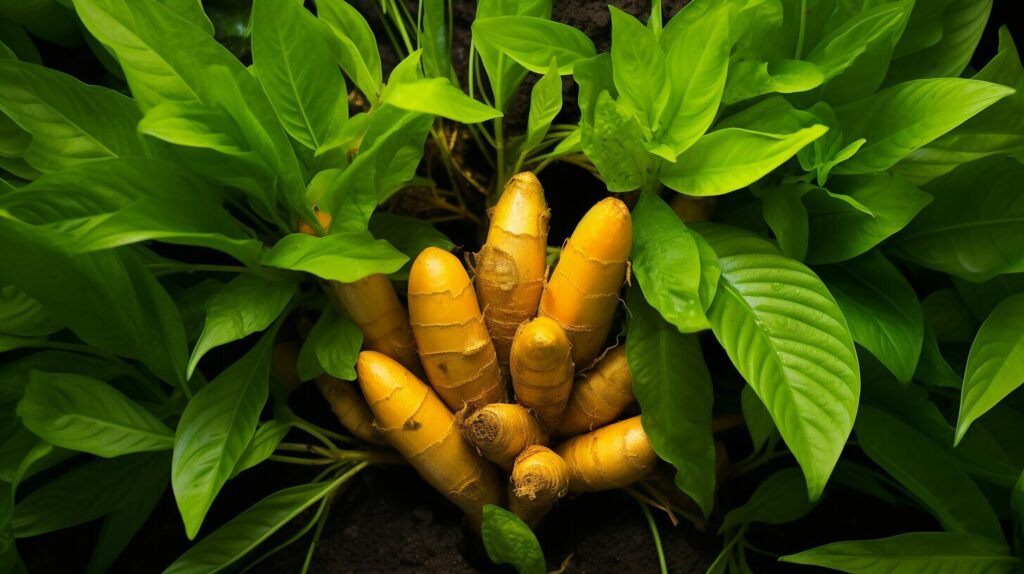
Digestive Support with Ginger
If you’re experiencing digestive discomfort or nausea, ginger may be the solution you need. Ginger has long been used as a medicinal plant and herb to relieve these symptoms. It’s also been shown to have anti-inflammatory properties, making it beneficial for gut health and potential anti-cancer properties.
The active compounds in ginger, such as gingerol and shogaol, are thought to be responsible for its medicinal properties. They can help reduce inflammation and improve digestion, making it a great option for supporting a healthy gut. Additionally, ginger has been found to be beneficial for reducing symptoms of nausea, vomiting, and morning sickness in pregnancy.
To incorporate ginger into your diet, try brewing ginger tea or adding fresh ginger to meals as a spice. You can also take ginger supplements in the form of capsules or in liquid form. As always, be sure to consult with your healthcare provider before taking any new herbal supplements.
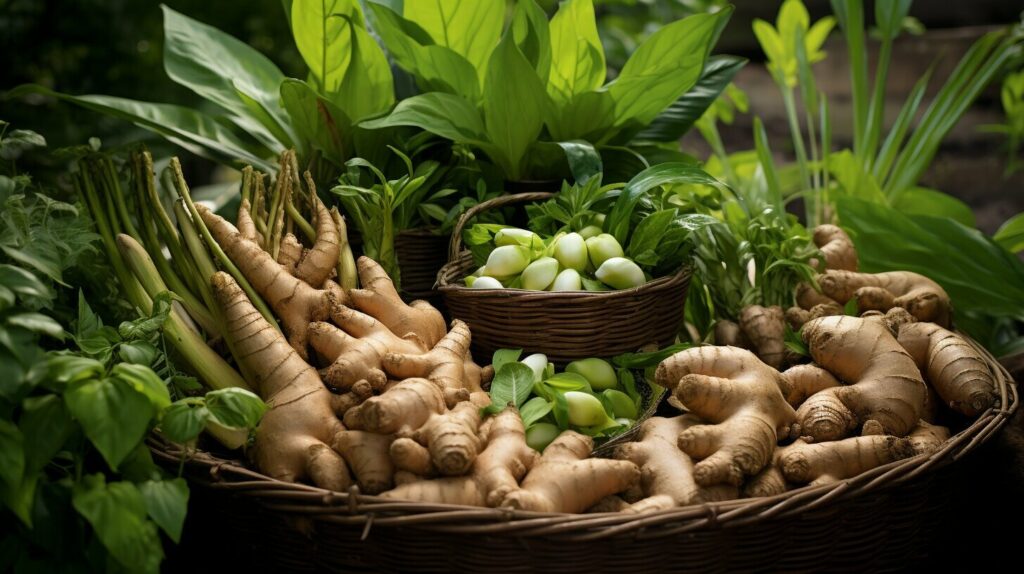
Ginger is just one of many beneficial medicinal plants and herbs that nature has provided us with. By incorporating these plant-based medicines into your routine, you can support your health and wellness in a natural way.
The Healing Power of Garlic
Garlic is one of the most popular and versatile medicinal plants and herbs used for its potent health benefits. With antibacterial and antifungal properties, garlic has been used for centuries as a natural antibiotic and immune enhancer.
The active compound in garlic, allicin, is responsible for its medicinal properties. Studies have shown that garlic can help lower blood pressure, prevent certain types of cancer, and improve heart health.
Garlic has also been shown to have natural anti-inflammatory properties, making it useful for treating a range of conditions, including allergies, asthma, and arthritis. It can also reduce the risk of developing certain chronic diseases, such as Alzheimer’s and dementia.
In addition to its impressive health benefits, garlic is also a flavorful and versatile kitchen staple. It can be used in a variety of dishes, including soups, stews, and sauces. Whether you are looking to boost your immune system or add some extra flavor to your meals, garlic is an excellent choice.
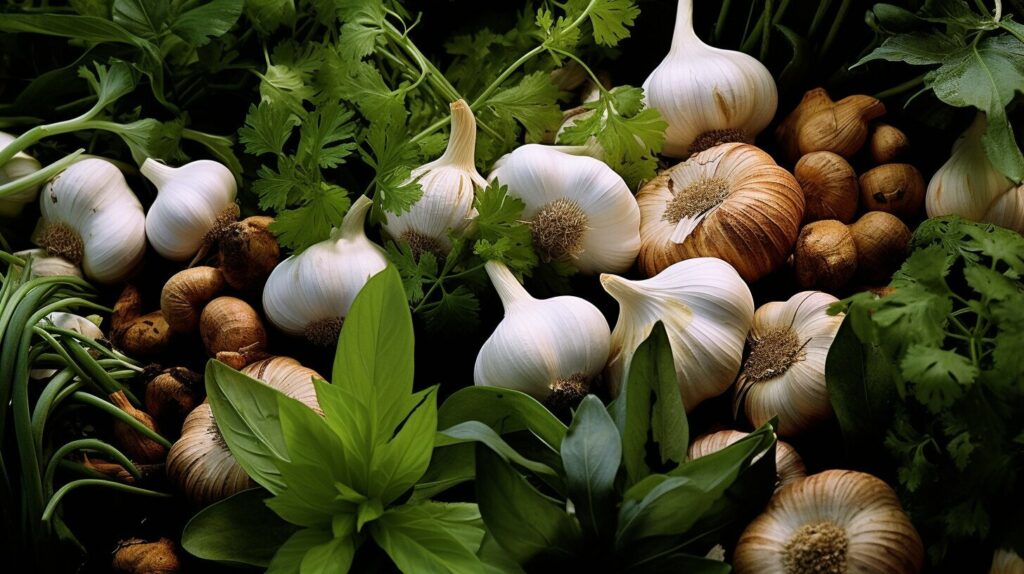
“Garlic has been used for centuries as a natural antibiotic and immune enhancer.”
Enhancing Cognitive Function with Ginkgo Biloba
If you’re looking for a natural way to improve cognitive function and memory, ginkgo biloba may be a great option for you. This medicinal plant has been used in traditional medicine for centuries and has gained popularity in recent years for its potential cognitive benefits.
Ginkgo biloba extract contains compounds called flavonoids and terpenoids that have antioxidant and anti-inflammatory effects in the body. These compounds are thought to improve blood flow to the brain, which can enhance memory, concentration, and overall cognitive function.
Research has shown that ginkgo biloba may be helpful in improving cognition in people with dementia and Alzheimer’s disease. It may also be beneficial for age-related cognitive decline in healthy individuals.
| Ginkgo Biloba Benefits: | Improves blood flow to the brain | Enhances memory and concentration | Potential benefits for age-related cognitive decline |
|---|
Ginkgo biloba supplements are available in various forms, including tablets, capsules, and extracts. It’s important to choose a reputable brand and consult with your healthcare provider before taking any new supplements.
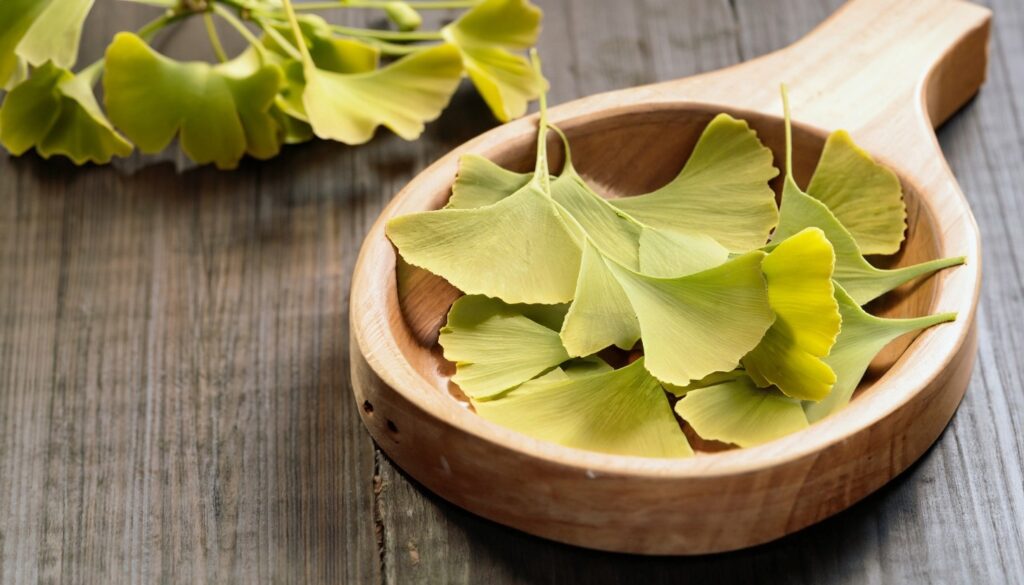
Overall, ginkgo biloba is a promising natural remedy for improving cognitive function and memory. It’s always important to speak with your healthcare provider before starting any new supplements, but if you’re looking for a natural way to boost your brainpower, it’s definitely worth exploring.
Mood-Boosting St. John’s Wort
If you suffer from depression, anxiety, or other mood disorders, you may be interested in using St. John’s wort as a natural remedy. St. John’s wort, also known as hypericum perforatum, has been used for centuries to treat a variety of mental health issues.
St. John’s wort is believed to work by increasing levels of neurotransmitters in the brain, including serotonin, dopamine, and norepinephrine. These neurotransmitters are responsible for regulating mood, emotions, and cognitive function.
While St. John’s wort is not a substitute for prescription medication for severe depression or other mental health conditions, it may be beneficial for mild to moderate cases.
In fact, a number of clinical studies have shown that St. John’s wort can be as effective as prescription antidepressants, with fewer side effects. Some studies have also found St. John’s wort to be effective in treating symptoms of anxiety and seasonal affective disorder (SAD).
If you are considering using St. John’s wort, it is important to speak with your healthcare provider first. St. John’s wort can interact with certain medications, including birth control pills, antidepressants, and blood thinners.

Additionally, St. John’s wort can cause photosensitivity, so it’s important to limit your exposure to sunlight while using it.
Overall, St. John’s wort is a natural option worth exploring for those looking to boost their mood and mental health.
Cooling and Soothing Peppermint
Peppermint is a popular herb used for its cooling and calming effects on the digestive system, making it a useful natural remedy for indigestion, gas, and bloating. It contains menthol, a compound that relaxes the muscles in the digestive tract, reducing spasms and relieving discomfort.
Peppermint tea is a simple and effective way to reap the benefits of this herb. You can steep fresh or dried peppermint leaves in hot water for 5-10 minutes and enjoy a soothing cup of tea that can help alleviate digestive discomfort. Peppermint oil is also widely available in the form of capsules, which can be taken orally to help relieve symptoms of irritable bowel syndrome (IBS).
However, it’s worth noting that peppermint oil can interact with certain medications, so it’s important to check with your doctor or healthcare provider before using it as a supplement.
Peppermint may also offer potential benefits for headaches and respiratory conditions. Its cooling effect can help reduce inflammation and relieve pain associated with tension headaches. Additionally, peppermint oil has been shown to have a soothing effect on the muscles in the respiratory system, making it a possible natural remedy for symptoms of cold, flu, and allergies.
It’s clear that peppermint is a versatile herb with a wide range of potential health benefits. Consider adding it to your herbal medicine cabinet as a natural remedy for digestive discomfort, headaches, and respiratory issues.
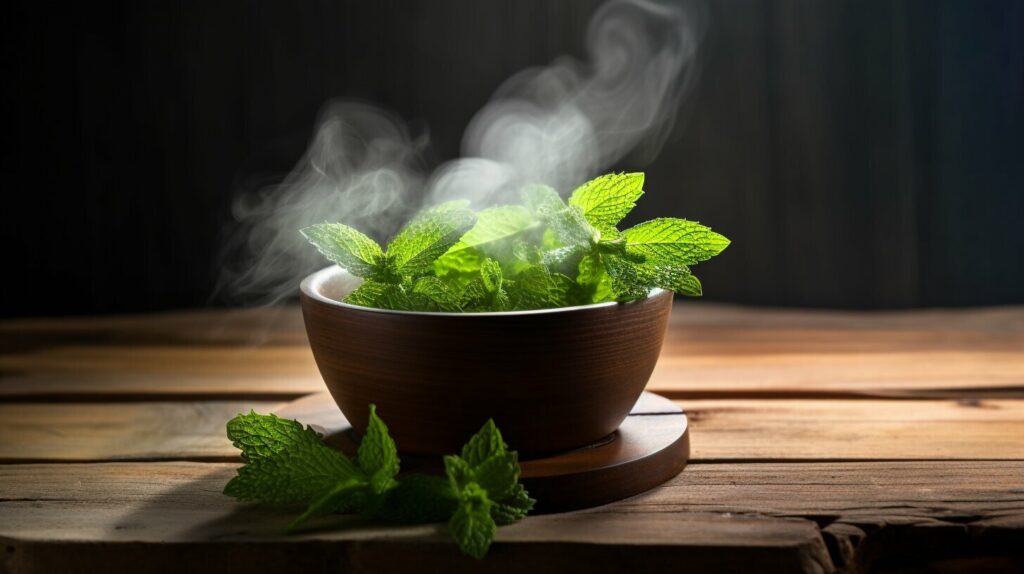
Relaxation and Sleep Support with Valerian
If you struggle with insomnia or anxiety, valerian may be a natural remedy worth exploring. Valerian is a medicinal herb known for its calming properties, which can help improve sleep quality and reduce feelings of anxiety.
Valerian works by increasing the levels of the neurotransmitter GABA in the brain, which helps to calm the nervous system and promote relaxation. Research has also suggested that valerian may help improve the quality of sleep, making it a popular choice for those who struggle with insomnia.
Valerian is available in a variety of forms, including capsules, extracts, and teas. The recommended dose varies depending on the form and concentration of valerian, so be sure to follow the instructions on the product label or consult with a healthcare professional.
It’s important to note that valerian may cause drowsiness, so it’s best to avoid driving or operating heavy machinery after taking it. Additionally, valerian should not be combined with other medications or supplements without first consulting with a healthcare professional.
Overall, valerian is a natural and potentially effective option for those looking to improve their sleep quality and reduce anxiety. If you’re interested in exploring the benefits of valerian or other medicinal plants and herbs, talk to your healthcare provider about whether they may be right for you.

Other Beneficial Medicinal Plants and Herbs
In addition to the aforementioned medicinal plants and herbs, several others offer numerous health benefits:
| Plant/Herb | Benefits |
|---|---|
| Milk Thistle | Known for its liver-protective properties, milk thistle can help promote healthy liver function. |
| Lavender | Lavender can help reduce stress and promote relaxation. It has also been used in traditional medicine to help with sleep and anxiety. |
| Green Tea | Rich in antioxidants, green tea is known for its health benefits, including reducing inflammation and improving heart health. |
| Feverfew | Feverfew has been used for centuries to help reduce the frequency and intensity of migraines and headaches. |
These plants and herbs, like the others discussed in this guide, can provide a natural and complementary option for improving health and wellness. Incorporating them into your daily routine alongside a balanced diet and regular exercise can offer numerous benefits.
Milk Thistle
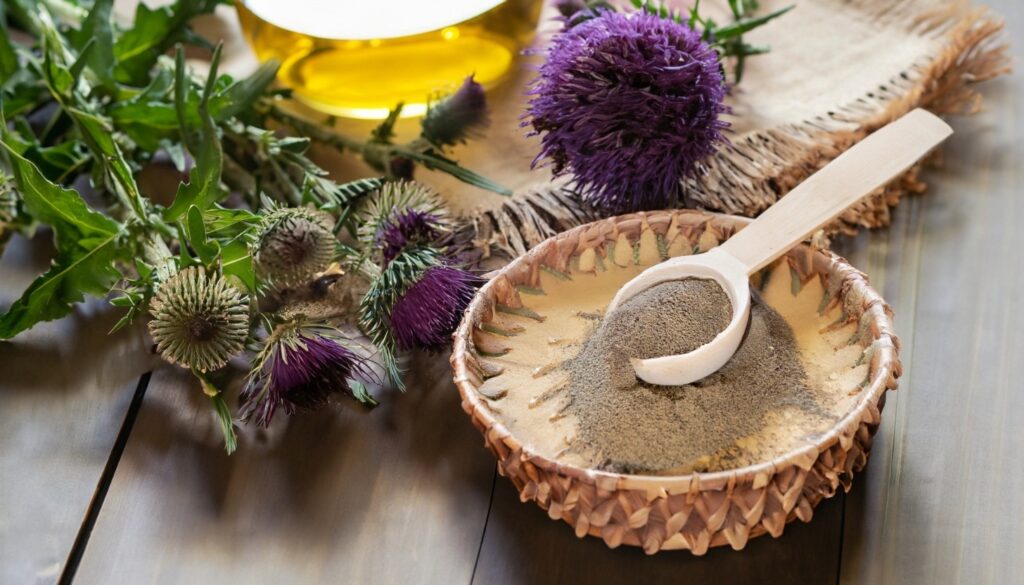
Lavender
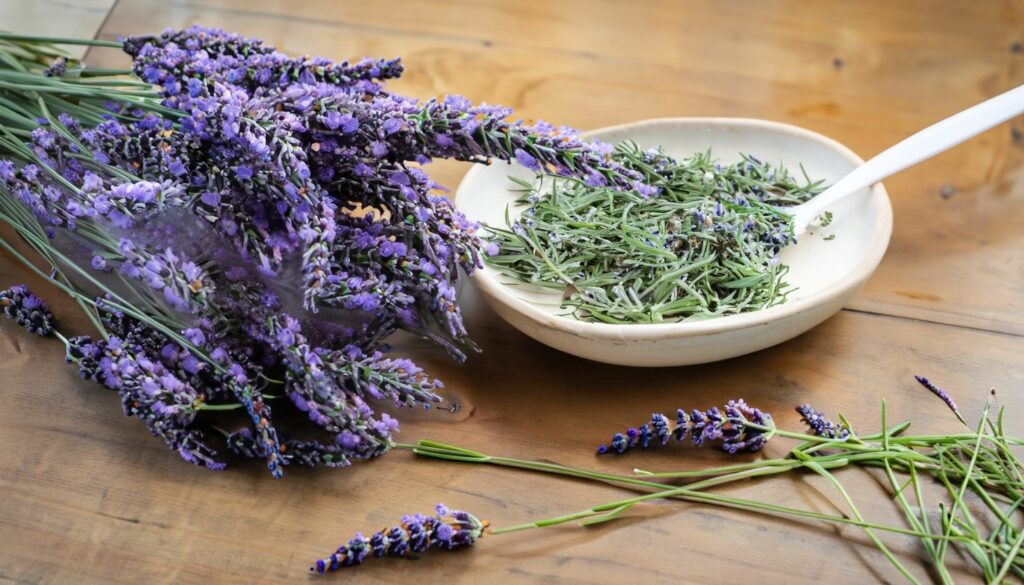
Green Tea
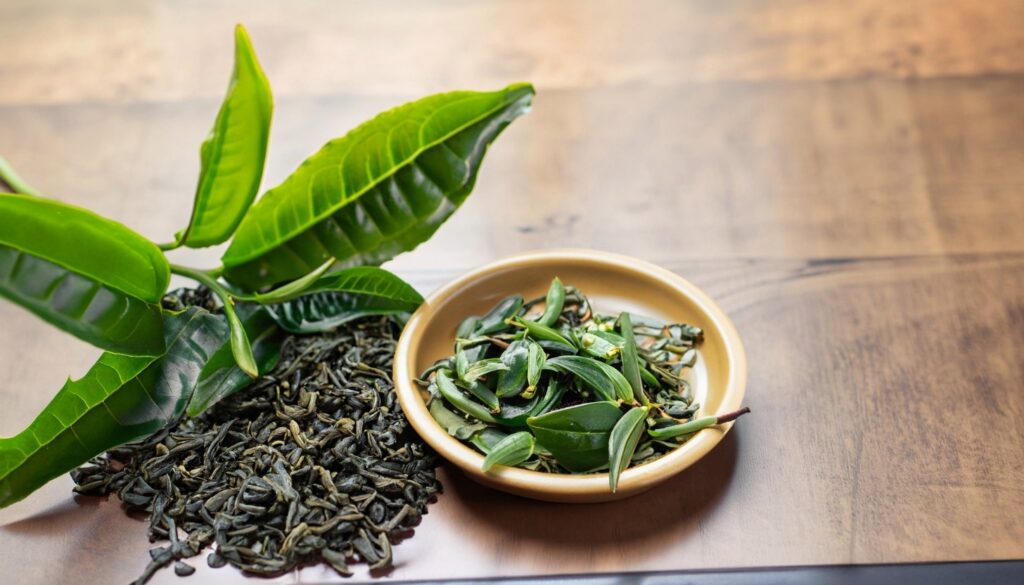
Feverfew

Conclusion
Using medicinal plants and herbs as natural remedies is a safe and effective way to promote health and wellness. Herbal medicine has been used for centuries, and it continues to gain popularity in modern times.
Through this guide, you’ve learned about the various benefits and uses of medicinal plants and herbs such as aloe vera, chamomile, echinacea, turmeric, ginger, garlic, ginkgo biloba, St. John’s wort, peppermint, valerian, milk thistle, lavender, green tea, and feverfew.
These plant-based medicines offer a holistic approach to healing, targeting the root cause of health problems instead of merely masking the symptoms. By incorporating natural remedies into your lifestyle, you can improve your overall health and well-being.
Herbal supplements and treatments can be used in conjunction with conventional medicine, and it’s important to consult with a healthcare professional before beginning any new treatment regimen.
Take charge of your health and explore the many benefits of medicinal plants and herbs for a natural way to support your body and mind.
Remember, nature’s pharmacy is always open for business, and natural remedies are a valuable asset to have in maintaining your health and wellness.
FAQ
Q: What are medicinal plants and herbs?
A: Medicinal plants and herbs are natural remedies derived from various plants that have been traditionally used for their therapeutic properties in treating and preventing illnesses.
Q: What are the benefits of using medicinal plants and herbs?
A: Using medicinal plants and herbs can offer a range of benefits, such as supporting immune function, reducing inflammation, improving digestion, promoting relaxation, enhancing cognitive function, and providing natural remedies for various health conditions.
Q: How can I use medicinal plants and herbs?
A: Medicinal plants and herbs can be used in various forms, including herbal teas, tinctures, capsules, topical creams, and essential oils. It is important to consult with a healthcare professional or herbalist for proper dosage and usage instructions.
Q: Are there any side effects or interactions with medicinal plants and herbs?
A: While generally considered safe, some medicinal plants and herbs may have potential side effects or interactions with certain medications. It is important to consult with a healthcare professional before incorporating them into your healthcare routine, especially if you have any underlying health conditions or are taking prescription medications.
Q: Can children and pregnant women use medicinal plants and herbs?
A: Certain medicinal plants and herbs may not be suitable for children or pregnant women. It is best to consult with a healthcare professional or herbalist before giving any herbal remedies to children or using them during pregnancy to ensure safety and appropriateness.
Q: Are medicinal plants and herbs regulated by any governing bodies?
A: The regulation of medicinal plants and herbs varies from country to country. In the United States, the Food and Drug Administration (FDA) does not regulate herbal supplements in the same way as prescription drugs. However, reputable manufacturers often follow good manufacturing practices and adhere to quality standards.
Q: Can medicinal plants and herbs replace conventional medicine?
A: Medicinal plants and herbs should be seen as complementary options to conventional medicine rather than replacements. They can be used in conjunction with conventional treatment plans to support overall health and wellness. It is important to consult with a healthcare professional for proper diagnosis and medical advice.
Q: Where can I find medicinal plants and herbs?
A: Medicinal plants and herbs can be found in health food stores, herbal shops, online retailers, and even in some grocery stores. It is important to source them from reputable suppliers to ensure quality and authenticity.
Q: How long does it take to see the effects of medicinal plants and herbs?
A: The time it takes for medicinal plants and herbs to show effects can vary depending on the individual, the specific herb, and the health condition being addressed. Some people may experience immediate relief, while others may require consistent use over a period of time. It is important to be patient and observe how your body responds.
Q: Can I grow medicinal plants and herbs at home?
A: Yes, many medicinal plants and herbs can be grown at home in herb gardens or containers. It can be a rewarding and cost-effective way to have access to fresh herbs for culinary and medicinal purposes. However, it is important to research the specific cultivation requirements and potential risks associated with each plant.




